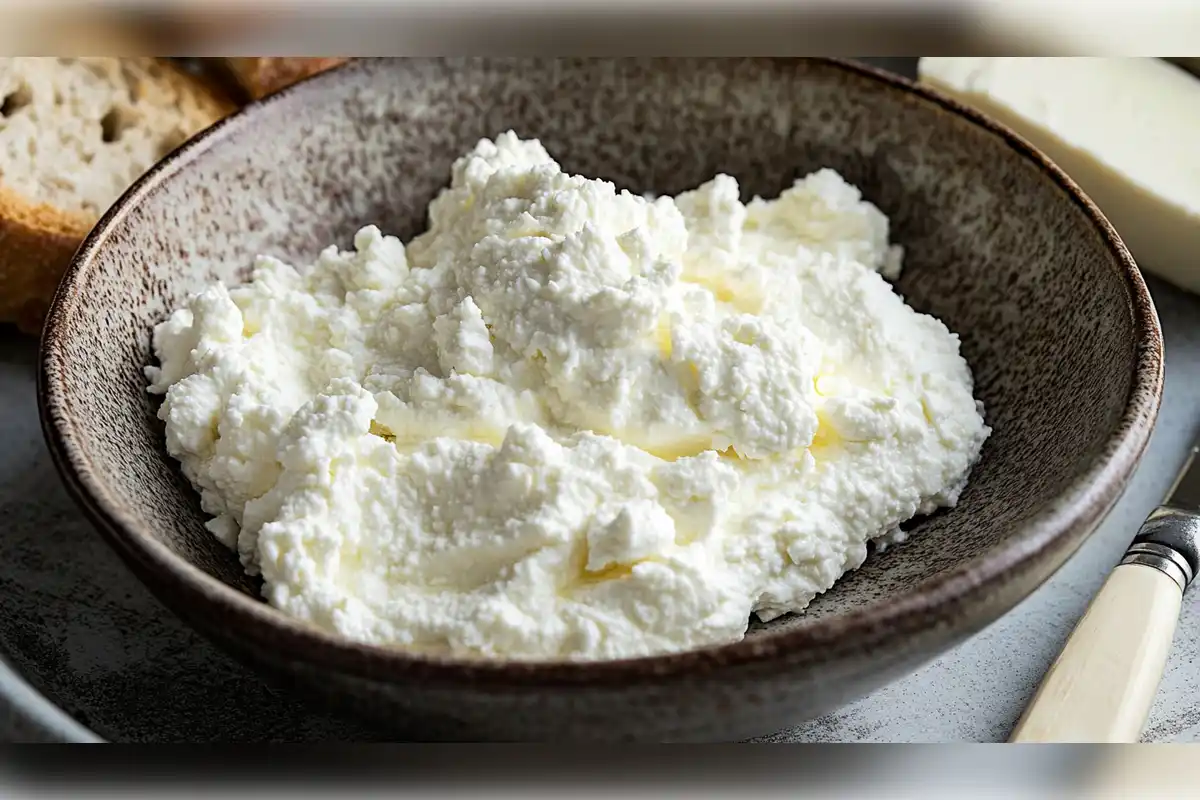When you’re in the middle of preparing a delicious dish and realize you’re out of ricotta, you might wonder, Can I substitute fresh mozzarella for ricotta? While both are popular cheeses used in many dishes, they differ in texture, flavor, and purpose.
What Are the Differences Between Fresh Mozzarella and Ricotta?
Before you start substituting, it’s important to understand the differences between fresh mozzarella and ricotta. These two cheeses are made differently, which impacts their texture and flavor.
What is Fresh Mozzarella?
Fresh mozzarella is a soft, stretchy cheese made from cow’s milk or buffalo milk. It’s known for its smooth, milky texture and is often used in Italian dishes like pizza, caprese salad, and lasagna.
- Texture: Stretchy and firm.
- Flavor: Mild, slightly tangy, and creamy.
- Uses: Fresh mozzarella is best in dishes that benefit from its melty, creamy nature.
What is Ricotta Cheese?
Ricotta is a soft, grainy cheese made from whey. It’s light, fluffy, and has a neutral taste, making it perfect for adding creaminess to both savory and sweet dishes.
- Texture: Grainy, soft, and fluffy.
- Flavor: Mild and slightly sweet.
- Uses: Ricotta is used in dishes where a creamy, light texture is desired, like lasagna, stuffed pasta, and desserts.
Is Fresh Mozzarella a Good Substitute for Ricotta?
The question many home cooks face is, Can I substitute fresh mozzarella for ricotta? The answer depends on the recipe you’re preparing. Let’s break it down.
When Mozzarella Can Be a Good Substitute for Ricotta
In certain savory dishes, fresh mozzarella can act as a suitable substitute for ricotta. For example, in lasagna or pasta fillings, mozzarella offers a creamy texture when melted.
- Lasagna: If you’re making a classic lasagna and don’t have ricotta, mozzarella can work well. It melts beautifully and adds a rich, cheesy flavor.
- Stuffed Pasta: In dishes like manicotti or cannelloni, fresh mozzarella can replace ricotta, especially if you prefer a more solid, stretchy texture rather than the grainy fluffiness of ricotta.
However, mozzarella is denser than ricotta, so expect a slightly heavier texture in your final dish.
When Mozzarella Is Not a Good Substitute for Ricotta
In some recipes, fresh mozzarella is not an ideal substitute for ricotta. Ricotta’s light, creamy, and fluffy nature is irreplaceable in certain dishes, especially in desserts or light pasta fillings.
- Desserts: Ricotta is often used in Italian desserts like cannoli or cheesecakes. In these cases, mozzarella’s texture and flavor won’t work, as it lacks the smoothness and mild sweetness that ricotta provides.
- Light Pasta Fillings: If you’re making delicate ravioli, ricotta’s airy texture is crucial for creating the right consistency. Mozzarella’s dense nature could make the filling too heavy and alter the dish’s balance.
How to Prepare Fresh Mozzarella as a Ricotta Substitute
If you’ve decided to go ahead and substitute fresh mozzarella for ricotta, there are a few tricks to make the substitution work better.
Drain Mozzarella to Remove Excess Moisture
Fresh mozzarella contains a lot of moisture, which can make your dish watery if not prepared correctly. To mimic the texture of ricotta, drain the mozzarella thoroughly before using it as a substitute.
- How to do it: Slice or tear the mozzarella into smaller pieces, then place them on paper towels or cheesecloth. Gently press to absorb and remove excess moisture.
Mix Mozzarella with Cream or Milk
To get a creamier texture closer to ricotta, mix your drained mozzarella with a bit of cream or milk. This creates a softer consistency, making it a better substitute in pasta fillings or lasagna layers.
- Tip: Start with a tablespoon of cream or milk and adjust based on how soft you want the cheese to be.
Best Dishes to Use Fresh Mozzarella Instead of Ricotta
If you’re thinking, Can I substitute fresh mozzarella for ricotta in my favorite dish, the answer is often yes! Below are some dishes where mozzarella can replace ricotta without sacrificing flavor or texture.
Lasagna and Pasta Dishes
In hearty pasta dishes like lasagna, manicotti, or cannelloni, fresh mozzarella can replace ricotta effectively. The mozzarella will melt beautifully, giving you a gooey, rich texture that’s perfect for these types of dishes.
- Pro Tip: Combine mozzarella with a little cream to soften it, ensuring it blends well with the other ingredients.
Pizza and Baked Dishes
If your recipe calls for ricotta in pizza toppings or baked dishes, mozzarella can step in without a problem. Mozzarella’s meltability makes it an excellent substitute for ricotta in these recipes.
- Pro Tip: If you like the creamy effect of ricotta, try blending the mozzarella with a spoonful of ricotta or cream cheese for a smoother texture.
Other Cheese Substitutes for Ricotta
While fresh mozzarella can sometimes be used as a substitute for ricotta, it’s not always the perfect choice. Depending on your dish, there are several other cheeses that can mimic ricotta’s texture and flavor more closely. Here are some alternatives you can use if you don’t have ricotta on hand.
Cottage Cheese
Cottage cheese is one of the most common substitutes for ricotta. It’s similar in texture, though slightly lumpier, and offers a similar mild flavor profile.
- Best Used In: Lasagna, pasta fillings, and savory dishes.
- Preparation Tip: If you’re looking for a smoother texture, blend cottage cheese in a food processor before using it as a ricotta replacement.
Cream Cheese
Another great substitute is cream cheese. Cream cheese is much denser than ricotta but offers a rich, creamy flavor that works well in both savory and sweet dishes.
- Best Used In: Baked goods, cheesecakes, or pasta dishes where you want a creamier texture.
- Preparation Tip: Soften cream cheese by letting it sit at room temperature or mix it with a little milk to achieve a more ricotta-like consistency.
Mascarpone Cheese
Mascarpone is another option, especially in Italian recipes. This soft, buttery cheese is smoother and richer than ricotta, which can add a luxurious texture to your dishes.
- Best Used In: Desserts like tiramisu, savory pasta dishes, or when making fillings for stuffed pasta.
- Preparation Tip: Mascarpone can be quite rich, so if you’re looking for a lighter option, mix it with a bit of cream or yogurt.
Goat Cheese
For a tangier substitute, fresh goat cheese can replace ricotta in certain recipes. While it’s much more flavorful, it offers a unique twist that works well in savory dishes.
- Best Used In: Pasta, pizzas, or savory pies where a stronger flavor is desired.
- Preparation Tip: Soften the goat cheese by mixing it with a bit of olive oil or cream to make it spreadable, mimicking the texture of ricotta.
How Substituting Fresh Mozzarella Affects Texture and Flavor
When you substitute fresh mozzarella for ricotta, it’s important to understand how it will affect the final texture and flavor of your dish.
Texture Changes
Ricotta is light, airy, and slightly grainy, making it perfect for dishes that require a creamy consistency without being too heavy. On the other hand, fresh mozzarella is firmer and denser. This difference in texture can make certain dishes feel heavier or less creamy than when using ricotta.
- In Lasagna: Mozzarella will provide a gooey, stretchy texture, whereas ricotta would offer a light, fluffy layer.
- In Ravioli or Stuffed Pasta: If you use mozzarella, expect a firmer, more solid filling. Ricotta would give the filling a smoother, softer bite.
Flavor Changes
While fresh mozzarella has a mild, milky flavor, it’s less creamy and sweet compared to ricotta. This can impact the overall taste of the dish.
- In Desserts: Ricotta’s mild sweetness works well in desserts, while mozzarella’s savory profile may not. It’s better to stick with ricotta or other cheese substitutes like mascarpone or cream cheese in sweet dishes.
- In Savory Dishes: Mozzarella can add richness to savory dishes, but it won’t deliver the same creamy lightness as ricotta.
Looking for inspiration? This Mozzarella-Stuffed Ricotta Ball Cooking Guide shows how to easily combine both cheeses in one dish.
Answering Common Questions About Cheese Substitutes
If you’ve ever wondered about substituting mozzarella or other cheeses for ricotta, you’re not alone! Here’s a detailed FAQ section addressing the most common questions, based on Google’s People Also Ask section.
FAQ 1: Is fresh mozzarella a suitable replacement for ricotta in lasagna?
Yes, fresh mozzarella can be used in lasagna as a substitute for ricotta, especially if you prefer a denser, cheesier layer. However, if you want the traditional creamy texture ricotta provides, you may need to mix mozzarella with some cream to achieve a similar consistency.
FAQ 2: What’s the best substitute for ricotta in baking?
For baking, ricotta is often used in desserts like cheesecakes or cannoli because of its light, fluffy texture. The best substitutes are cream cheese or mascarpone, as they provide similar creaminess and work well in sweet recipes.
FAQ 3: Can mozzarella be used as a ricotta substitute in ravioli?
While you can use mozzarella in ravioli, it will create a much firmer filling than ricotta. To get a creamier texture, consider blending mozzarella with a bit of cream or opting for a different cheese like cottage cheese or mascarpone.
FAQ 4: How do I make mozzarella mimic ricotta’s texture?
To make fresh mozzarella more similar to ricotta, you’ll need to adjust its texture. Drain the mozzarella thoroughly to remove excess moisture, then mix it with a small amount of cream or milk to soften it. This will make it a better substitute in dishes like lasagna or stuffed pasta.
FAQ 5: Are there better substitutes than mozzarella for ricotta in desserts?
Yes, for desserts, it’s better to use cheeses like mascarpone or cream cheese instead of mozzarella. These cheeses are closer to ricotta in both texture and flavor, making them ideal for sweet dishes like cheesecakes or cannoli.
Conclusion
So, can you substitute fresh mozzarella for ricotta? In many savory dishes, yes — mozzarella can be a good stand-in for ricotta, especially in lasagna, stuffed pasta, or pizza. However, it’s important to keep in mind the textural and flavor differences between these two cheeses. Mozzarella is denser and less creamy, so it may not work well in lighter dishes or desserts where ricotta’s fluffiness is key.
If you’re out of ricotta and looking for alternatives, other cheeses like cottage cheese, cream cheese, or mascarpone might be better options depending on the recipe. Always consider the role the cheese plays in the dish, and adjust your preparation to ensure the best results.
By following these tips and understanding the differences, you’ll be able to confidently substitute fresh mozzarella or other cheeses in your recipes and still achieve delicious results!

